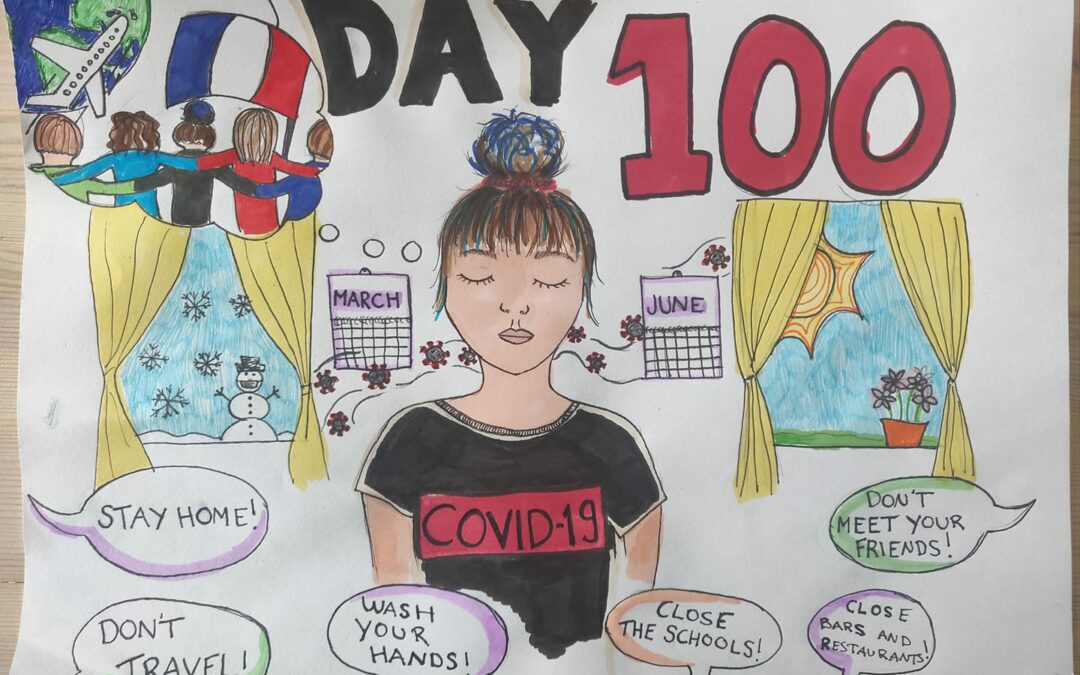March/April 2020: France barricades itself at home to deal with the current global health emergency. They generically call it Coronavirus, but the scientific name is SARS-CoV-2, a new virus that has never been identified before in humans and is able to cause the disease called “Covid-19”, an infection that in the most serious cases can manifest itself as Severe Acute Respiratory Syndrome (SARS). Do you remember this name? The epidemic that caused thousands of sick people in Southeast Asia between 2002 and 2003. At the time everything seemed so far away and we in Europe felt quite safe.

Today, here in Bordeaux, as in other French cities as well as in the rest of the continent, people are forced to limit their movements, their daily freedoms, what we have always considered normal and taken for granted, as: a coffee at the bar, a dinner with relatives, going to work, a walk in the park, a workout in the gym, a reading in the library, an exhibition at the museum, a film at the cinema, a lesson at school and university, but also simply attending public places. We are depriving ourselves of these in the name of world security. We are redefining our concepts of space and time, our physical and mental boundaries, our habits, often our values. This sad story of the virus is perhaps forever changing the way we live. In some countries, such as Italy, where the virus is manifesting all its virulence, the quarantine has reached almost a month. Here, in France, two weeks.
Will that be enough? How much longer will it last? Everywhere the institutions have decided to control the current epidemic (already defined “pandemic” by the World Health Organization) with more restrictive actions: closed borders, reduced transport and shipments, offices, shops, companies whose production is not currently a priority must stop their activities. A checkmate for national economies to try to save more lives.
Out of respect for all the pain, for the sick and tragically deceased people and their families, we could try to find our own path in this matter that is as positive as possible. For example, we could have time to indulge in what we like best without looking at the clock. Finally we don’t have to say “It’s late!”. It’s true, often moments of boredom, perhaps nostalgia for what we were doing before the quarantine, can happen during our days together with moments of discouragement and sadness. But it is also good to be optimistic and hopeful, not to let the bad mood win over the good intentions. It is possible, in fact, to enjoy one’s time to the fullest, to indulge in activities with greater involvement and without distractions (if we do not consider the social messages from distant friends and relatives). It is also possible to reflect on one’s own actions, dwell calmly on what we do and correct ourselves without having to postpone it until later. A little music could mark the hours, give us the rhythm to face this forced quarantine with a smile and a dance.

But how are we volunteers living the quarantine in Bordeaux? We are missing the daily routine dictated by group activities, the evenings at Meba’s headquarters, the interventions on the radio, the simple meeting. The future is in doubt and the next few weeks will be different from September 2019. We miss each other, too.
And so here, maybe we can take the time to reflect on our relationship with the world, which now seems so far away and out of reach: with ourselves first of all and with others. We can reflect on our goals, on our work, on our hobbies, on how we would like the rest of this year, to be included in the history books. Nothing is lost and quarantine will bring aspirations and plans, plus a few extra grams on the scales.

To escape the distance, we keep our bodies and minds trained: between some abdominals, some yoga and some stretching, we share cultural advice on readings, games, movies, exercises, as well as tender memories and funny photos; we dedicate ourselves to writing, individual French lessons, the study of particular editing programs on the computer, some online courses, and why not to cooking, cleaning, self-care and interpersonal relationships; we project ourselves to the future with some fears but with a lot of hope, always thinking of new ideas to propose and solutions for every problem of daily life. We are certain that the historical period is difficult for all of us and that we are at the beginning of a hard battle, but we are also convinced that from home we can continue to share the core values of our mission and make the lifeblood of the project we support: above all by remaining united, even if far away, even if only with our head and heart.
Piera Feduzi
